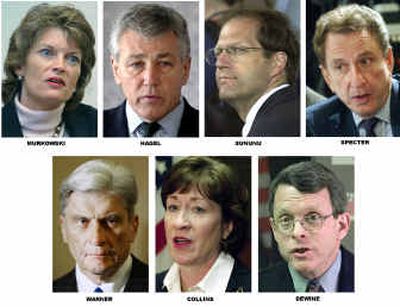Panel OKs defense bill

WASHINGTON – A Senate committee approved a $441.6 billion defense bill for fiscal 2006 that envisions spending an additional $50 billion next year for the wars in Iraq and Afghanistan.
“Our forces serving around the world are truly the first line of defense in the security of our homeland, and they deserve our strongest support,” Sen. John Warner of Virginia, chairman of the Armed Services Committee, said after the authorization bill passed on Friday.
“This bill provides our men and women in uniform and their families, the resources and authorities they need to successfully carry out their missions.”
The bill:
“Adds $1.4 billion over the president’s budget request for force protection gear for service members.
“ Authorizes $109.2 billion for military personnel, including costs of pay, allowances, bonuses, death benefits and permanent change of station moves.
“Authorizes the budget request of $3.4 billion for the Future Combat Systems program, including $231.6 million for the Non-line of Sight Launch System and $107.6 million for the Non-line of Sight Cannon.
“ Authorizes $344.2 million for up-armored high mobility multipurpose wheeled vehicles and wheeled vehicle add-on ballistic protection to provide force protection for soldiers in Iraq and Afghanistan.
The bill also authorizes $878.4 million for 240 Stryker vehicles. Critics of the Army’s Stryker troop-carrying vehicle say it inadequately protects soldiers.
Congress had approved on Tuesday an additional $82 billion for war in Iraq and Afghanistan and to combat terror worldwide, boosting the cost of the global effort since 2001 to more than $300 billion.
The Senate approved the measure unanimously, 100-0. Earlier, the House of Representatives easily approved the measure. It now goes to President Bush for his signature, which is certain.
That bill includes sweeping immigration changes, a nearly tenfold increase in the one-time payment for families of troops killed in combat and money to build a sprawling U.S. Embassy in Baghdad, Iraq’s capital.
Most of the money – $75.9 billion – is for military operations in Iraq and Afghanistan, while $4.2 billion goes to foreign aid and other international relations programs.